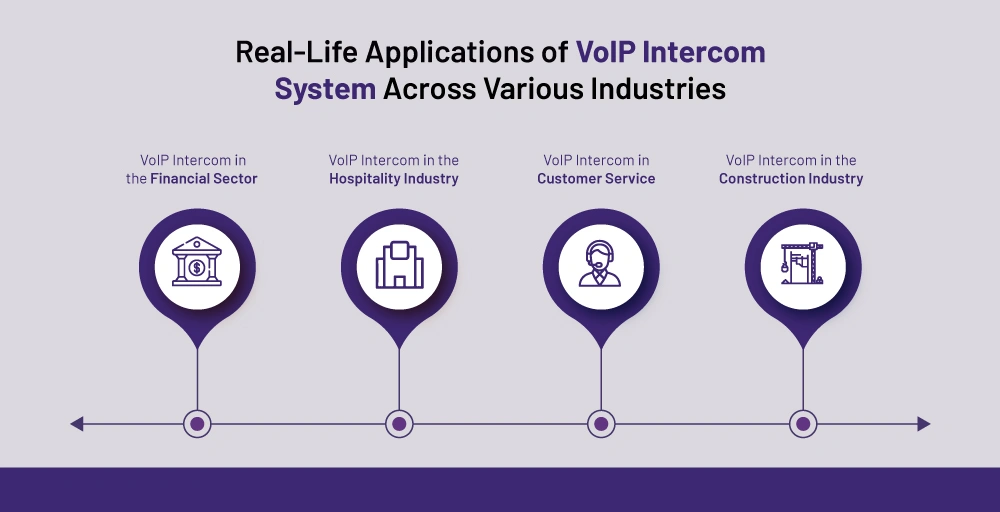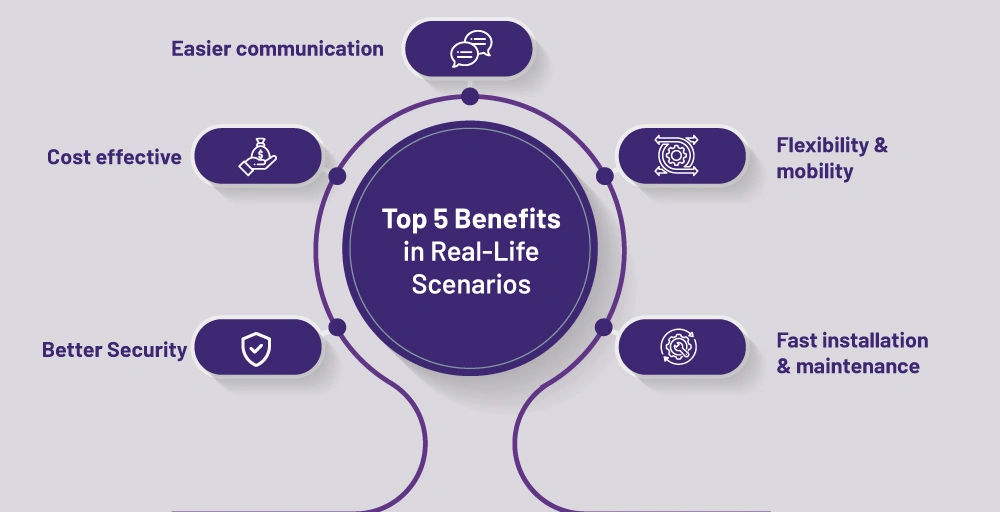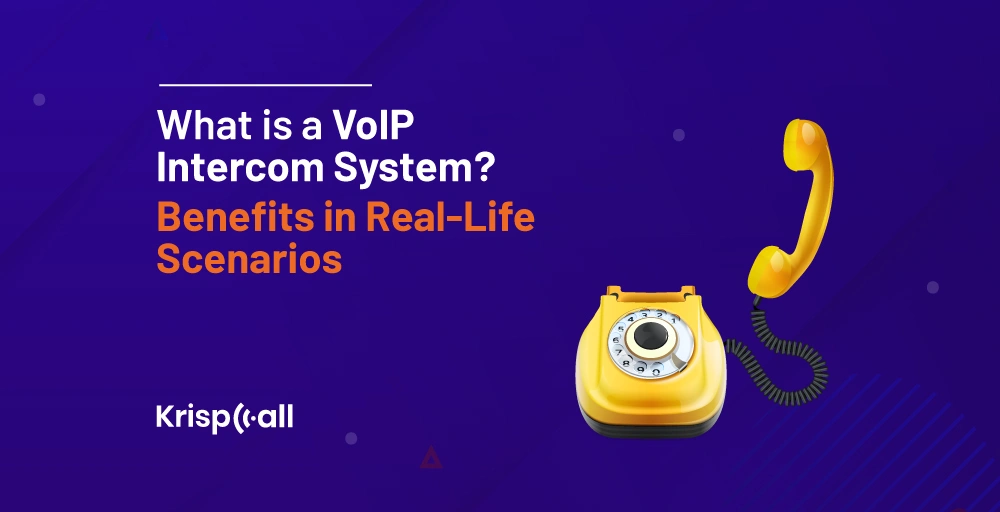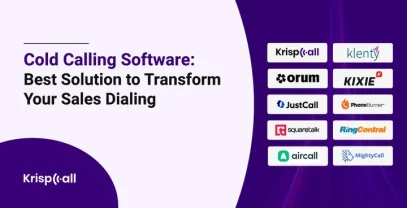VoIP technology has changed how people work in the last few years. Similarly, businesses save money using VoIP phone systems instead of regular landlines. VoIP also lets you do video calls that landlines can’t.
But VoIP is useful for more than just phones – it works for intercoms, too 😎.
IP intercom systems are becoming more popular with companies. These systems can act like a regular door buzzer to control who goes in and out of a building and connect people through an intercom call.
This article will explain what a VoIP intercom system is, the different kinds of it, the benefits, the real applications of how companies use it, and which VoIP intercom system is best for your business.
🔑 KEY HIGHLIGHTS
- VoIP technology allows intercom systems to facilitate door entry and inter-facility communication.
- VoIP intercom systems have types, such as Hardware IP-based, Cloud IP-based, and Self-Contained IP-based intercom systems.
- VoIP intercom systems benefit various industries, such as finance, hospitality, customer service, and construction.
- Schools, gyms, offices, parking lots, and hotels are among the real-life scenarios where VoIP intercoms are useful.
What is a VoIP Intercom System?
VoIP intercom is a type of communication equipment that e

VoIP intercoms use Voice over Internet Protocol technology. Compatible with VoIP phones and IP PBX services, they don’t require installing new hardware or adapters; they only need reliable WiFi connectivity.
Types of VoIP Intercom Systems
The types of VoIP intercom systems are:
1. Hardware IP-based telephone system
This type of VoIP intercom phone system uses the company’s computer and is placed in a room with other tech equipment. It has IP phones hooked up to the computer through the building’s local network or even from far away using a more extensive network. The phones can call each other like an intercom does.
If you need an intercom by a door, many companies also make gadgets that plug into the phone system. When someone pushes the button, it calls a particular person or group of people instead of making a regular call. So it works just like a phone, but only when someone comes to the door.
2. Cloud-based IP telephone system
With this system, instead of buying the equipment upfront, you pay a monthly fee to use an online service. The phones connect over the Internet to a server in a data center somewhere else. The features are the same; you can use SIP door intercoms just like the equipment system.
There are intercoms for multiple tenants that use a service like this. A multi-tenant intercom is at the doors of places with many people, like apartments, condo buildings, or office suites. When someone comes to the door, they pick who they want. You can buy the hardware for the door and then pay a monthly fee per user for the online service that provides features over the internet, like hosting video calls with this system.
3. Self-Contained IP-Based Intercom System
This type of system doesn’t need an online hosting service or computer server hardware. One of the stations has its own website to control a system with up to 32 stations (or more if you pay extra). This system comes with or without a built-in video camera. These intercoms have excellent, loud sound quality, even with noise canceling.
Since the system can work on its private network, it doesn’t require internet access. By now, you should know what an IP intercom is and how it works. In the next part, we’ll talk about the real-life applications of VoIP intercom systems.
Real-Life Applications of VoIP Intercom System Across Various Industries

1. VoIP Intercom in the Financial Sector
VoIP phone systems work very well for the fast-growing financial sector, which never stops. VoIP solutions can handle the pressure of the financial sector since the industry needs responses around the clock.
Since financial professionals with changing schedules must meet clients off-site, smooth communication from any device is crucial. Therefore, VoIP Intercom supports financial professionals by offering responsiveness through adjustable call management, such as adding customer service reps or lines based on needs.
Global operations of financial companies also integrate well with VoIP’s low-cost international calls. Employees can focus on deals when talking to customers worldwide instead of worrying about phone bills.
2. VoIP Intercom in the Hospitality Industry
Hotels need smooth communication 24/7. Therefore, VoIP Intercom handles and places all incoming and outgoing calls from guests and other customers at any time, ensuring customer satisfaction.
Additionally, VoIP systems can handle a high number of calls. Calls are quickly sent to available customer service workers, so no questions are missed no matter how busy they are. VoIP also helps busy employees with things like voicemail transcripts in emails. Guest messages can be directly sent to workers’ inboxes, ensuring fast replies even while on the move.
VoIP provides excellent help for communication-important hotel companies. Features simplify tasks for time-pressed professionals. Extra customized options like branding numbers can support marketing efforts through better customer identification.
3. VoIP Intercom in Customer Service
VoIP works well for customer service jobs where agents must quickly answer all kinds of questions correctly. VoIP phone systems quickly integrate with CRM programs, letting agents access all the customer info they need from one easy-to-use website. With one click, they can see full profiles and take good notes to provide a pleasant customer experience.
VoIP also helps monitor how customers and agents do their jobs. This helps make the process better and ensures agents give excellent service by doing well. Extra training addresses any areas needed for improvement using call details and records.
Additionally, worldwide access makes agents available for calls anytime, providing consistent customer service anytime customers contact the business.
4. VoIP Intercom in the Construction Industry
Construction workers don’t usually work from an office, so they need a flexible phone system that allows them to be mobile. VoIP systems enable them to stay connected through their mobile devices using internet connectivity.
This means they can receive important calls from customers or supervisors even while on-site or traveling between locations, ensuring smooth communication regardless of their whereabouts.
Workers can choose their favorite device, such as a smartphone or tablet, to use. This way, even if they’re moving around on a job site, they won’t miss any important calls.
Plus, when customers call in, they’ll hear a menu that helps them reach the correct department quickly. That means no more waiting on hold or getting bounced around to different people.
Top 5 Benefits in Real-Life Scenarios
VoIP Intercom definitely has many benefits for different industries. Now, let’s examine how it is beneficial in real-life scenarios.

1. Better security
Modern VoIP intercom systems can do the work that traditional ones do even better than before. Things like cameras that stream live anytime provide more security. They are proven to be instant ways of halting the mentioned attacks and assaults.
2. Cost-effective
VoIP uses the Internet and is not predicated on expensive phone lines and hardware equipment. This has benefits for businesses that have customers who need to convey a lot of information. Such systems can provide the same quality but at much lower costs, allowing you to keep your budget.
3. Easier communication
Using VoIP intercom, team members get connected conveniently, and the conversation is more budget-friendly and group-based. Team members will better explain everything on-site, and the outcomes will improve significantly.
4. Flexibility and mobility
Intercom systems based on VoIP are very important for modern workplaces, in which agility is vital. Employees now have the ability to communicate from their office desk, while on the road, or even from another country using a cloud-based setup. This makes it super convenient for firms and employees to fly for business and also facilitates remote work, so teams are able to meet easily.
5. Fast installation and maintenance
VoIP intercoms are speedy and simple to install. Even places that have little success with technology can use these tools. They can be widely exploited, comfortable to use, and cost hardly anything to maintain and cost. Whether small businesses or big enterprises, they all can benefit from VoIP intercoms.
Choosing the Best VoIP Intercom System for Your Business
When picking a VoIP intercom for your business, you must consider some important things. The intercom needs clear speaking so people can hear each other well. It also needs to work reliably all the time since businesses count on their phones.
Here are some additional things you should look out for before choosing a VoIP intercom system:
- Check your internet – Make sure your connection is fast enough for clear VoIP calls before looking at providers. Speed is important for quality service.
- Decide what features you need – Do you want call forwarding, caller ID, conference calls? Figure out what’s essential for talking with employees and customers.
- Research providers – See what options are available and look at their experience level, features offered, cost, and reviews. Find one that fits your business needs.
- Does your equipment work with them? – Providers should say what devices they support, like phones and routers. Or they can test compatibility to avoid issues.
- Ask about call quality – You want clear calls, so ask how providers ensure this and what they do if problems occur. Good customer service is important, too.
- Guarantee satisfaction – Look for money-back offers to safely try a provider without risks if you don’t like the service.
- Consider traffic handling – Traffic prioritization features are the best way to prevent call interruptions, even during peak times.
- Disaster recovery plans – Know backup strategies if outages happen due to emergencies so you can get back to business fast.
- Local numbers – Make sure numbers are local so customers don’t pay long distances to contact you.
- Emergency call support – E911 should work properly to get help quickly in case of emergencies.
Wrapping Up
VoIP intercom systems help different types of businesses by allowing people to communicate quickly and effectively without being in the same place. Additionally, they provide exceptional security features that can monitor suspicious activities, preventing any problem that may have occurred otherwise.
Thus, implementing the right VoIP intercom tech can maximize how your customers and employees experience things, make things secure, and streamline operations.
FAQ
What is an IP intercom system?
An IP intercom system is an electric intercom that uses a computer network, instead of wiring, to talk to each other. It connects to the network that links devices to the internet or local area network.
Can a cell phone be used as an intercom?
Yes, Cell phones can be used as intercoms in some ways. Things like conference calls on phones or apps that let phones talk over Wi-Fi simultaneously allow cell phones to be used as makeshift intercoms. But an actual intercom works better and is more reliable.
Can you run an intercom over a wireless network?
Yes, IP intercoms can work over a wireless network. Many systems let the intercom pieces talk to each other using Wi-Fi instead of cables, making them easier to install without running wires everywhere.
What is the main purpose of VoIP?
The main purpose of VoIP is to make phone calls online instead of regular phone lines. It changes your voice into small internet data packets traveling over computer networks so connected devices can talk like phones.





